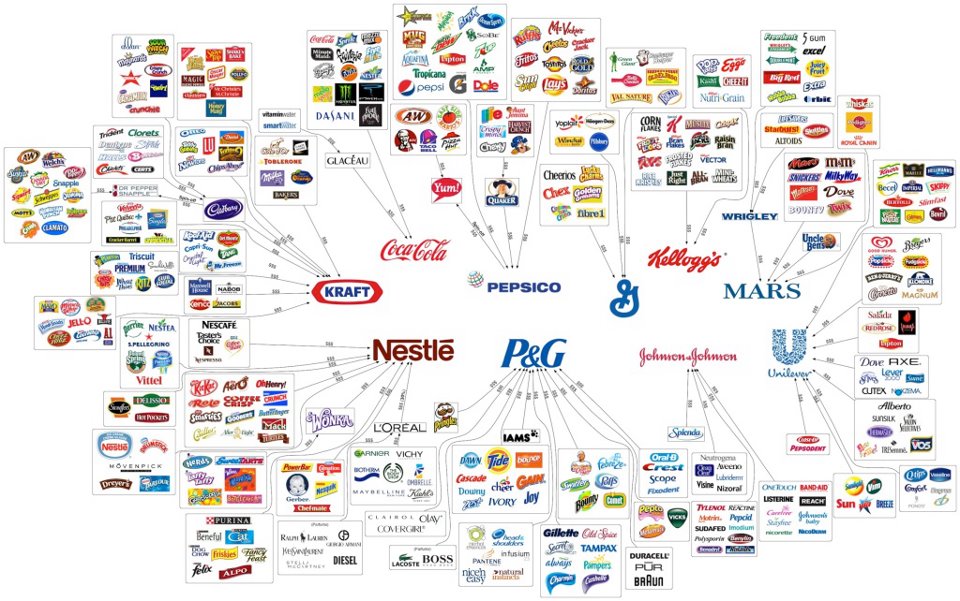
[Download this image in better resolution here]
Many people probably saw this image that has been going around facebook, a visualization of our “choice” in food brands, tracking many smaller brands back to a few global players, the usual suspects, coca cola, kraft, nestle, etc.
When i saw it, I was reminded of a list of who owns some of the organic health food companies in the USA:
Leirre Keith: The Vegetarian Myth – Page 114
Recently during a discussion with a vegan friend I mentioned this list, cited by lierre keith in her book the vegetarian myth. I find many other points in that book very questionable or even disagree with them completely, but this list alone should make anyone re-evaluate how environmentally helpful a vegan/vegetarian diet really can be.
If companies like exxon/mobil, monsanto, mcdonalds and of course big agriculture companies have an interest to invest in soy products and organic health food companies, there must be something fishy going on.
This article appears to be the source of the information quoted by keith:
What We Need to Know About the Corporate Takeover of the “Organic” Food Market by Carole Resnick
A familiar brand name to organic shoppers is Hain. This company now owns many other organic brands, which continue to appear to be independent. Some examples include: Bearitos (chips), Bread Shop (granola), Celestial Seasonings (tea), Garden of Eatin’, Health Valley, Imagine Foods (Rice Dream), Terra Chips, and Westbrae (canned vegetables, soy drinks, pastas, and more). And who owns Hain? The prime investors in the Hain Food Group are mutual funds and holding companies. Their principal stockholders are Phillip Morris (tobacco), Monsanto (genetically modified food), Citigroup (responsible for rainforest destruction), Exxon/Mobil, Wal-Mart, Energy Nuclear, and Lockheed Martin (weapons manufacturer). In 9/99 the H.J. Heinz Co. acquired ownership of nearly 20% of Hain. And, no surprises here, Heinz is principally owned by the same mutual funds and principal stockholders as is Hain.
Cascadian Farms (the brand offering much of the organic frozen food on the market) and Muir Glen (tomato products) are owned by Small Planet Foods, which is the organic marketing “niche”owned by General Mills, the third biggest food conglomerate in North America. Agribusiness is guilty enough for negative impacts on the global environment, local economies, and the nutritional quality of the food most of us have little choice but to consume. But look who “owns” General Mills. Their principal investors are Philip Morris, Exxon/Mobil, General Electric, Chevron, Nike, McDonald’s, Target Stores, Starbucks, Monsanto, Dupont (weapons & pesticides), Dow Chemical (Agent Orange, breast implants, napalm), Pepsico, Alcoa Aluminium, Disney, and Texas Instruments (weapons producer and one of G.W. Bush’s top contributors).
Fresh Samantha, a popular organic juice brand regionally produced in Maine, merged with Odwalla in 5/00. Little do health conscious consumers suspect that Odwalla Juice is owned by CocaCola, as part of their Minute Maid unit. Boca Burgers is owned by Kraft Foods, which is owned by Philip Morris. Stoned Wheat Thins is made with GMOs (genetically modified organisms) and is owned by Nabisco, which was acquired by Philip Morris in December, 2000. Arrowhead Water and Poland Spring Water are owned by Nestle (which is being boycotted because its “breast milk substitute” causes the deaths of millions of babies). Silk Soy Drink is owned by White Wave, which is owned by Dean Foods, whose main shareholders are Microsoft, General Electric, Philip Morris, Citigroup, Pfizer, Exxon/Mobil, Coca Cola, WalMart, PepsiCo, and Home Depot.
Writing for the New York Times Sunday Magazine (5/13/01), Michael Pollan reported that Organic Cow, previously represented to consumers as an organic dairy based in the Northeast and consisting of a network of small farms, was bought out by Horizon. Another source of organic dairy products, Horizon is a $127 million public corporation that has become the Microsoft of organic milk, controlling 70 percent of the retail market. The milk is now “ultrapasteurized” using a highheat process that “kills the milk,” destroying its enzymes and many of its vitamins so it can be sold over long distances. Arguably, ultrapasteurized organic milk is actually less nutritious than conventionally pasteurized non-organic milk. Horizon’s “factory farms” in the West are described as a clear example of the certifiability of inhumane practices through the emerging corporate organics system. Pollan writes: “On Horizon’s dairy farms in the west, thousands of cows that never encounter a blade of grass spend their days confined to a fenced dry lot, eating (certified organic) grain and tethered to milking machines three times a day.”
Now, many of these companies are only known in the USA, some we know here as well, Celestial Seasonings, Health Valley, Westbrae. I remember many of them when I was a vegan, organic food coop shopper, and naturally I was shocked.
But I wonder, if it is as bad in Switzerland and Europe. Something worth researching, if anyone wants to help?
Edit 1:
We already checked Biofarm here in Switzerland. Pheew, it seems to be ok, owned by a cooperative.
Rapunzel seems okay as well, according to this article, Nestle und Rapunzel.
Lima, a good european source for japanese based health foods like Miso, Seaweed, Soysauce etc. however is owned by Hain, which is owned by … see above. Other Hain brands operate in Europe, but we didn’t know them that well. Some nice body care products like Avalon Organics and Jason are also in the Hain Group portfolio, see here.
edit 2: this website has a bunch of infographics showing the Organic Processing Industry Structure:
especially interesting is the animation depicting acquisitions over time between 1995 and 2007.

Hello Jan. I too like to grow vegetables, and eat them. I have opinions on most things, and like you, people don’t seem to care, but I’m optimistic that it’s worth the effort anyway. Glad you’re just joking, er, not joking… Martin Vicker (Spain)
He he, you made me smile, even though I just read that Monsanto bought the biggest bee research company Beeologics. The cynicism continues.